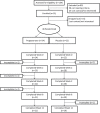Progesterone and Postpartum Smoking Relapse: A Pilot Double-Blind Placebo-Controlled Randomized Trial
- PMID: 27613934
- PMCID: PMC5055745
- DOI: 10.1093/ntr/ntw156
Progesterone and Postpartum Smoking Relapse: A Pilot Double-Blind Placebo-Controlled Randomized Trial
Abstract
Introduction: Pregnancy is a strong motivator to quit smoking, yet postpartum relapse rates are high. Growing evidence suggests a role of sex hormones in drug abuse behavior and given the precipitous drop in sex hormones at delivery, they may play a role in postpartum relapse. This pilot study evaluates the feasibility and potential role of exogenous progesterone in postpartum smoking relapse.
Methods: This 12-week double-blind placebo-controlled randomized pilot trial randomized 46 abstinent postpartum women to active progesterone (PRO; 200mg twice a day) versus placebo (PBO) for 4 weeks. Participants were followed for relapse for 12 weeks. Main study outcomes include abstinence (point prevalence), feasibility (compliance per number of clinic visits attended, pill counts and Electronic Data Capture [EDC] completed) and self-reported acceptability. Safety was also measured by depressive symptom scores, adverse events, and breastfeeding.
Results: Overall retention rate was 87% at week 12. At week 4, abstinence rates were 75% in the PRO group and 68.2% in the PBO group (p = .75). Medication adherence was 68% and clinic visit attendance was 80%, with no differences by randomization. Depressive symptom scores, adverse events, and breastfeeding did not vary by randomization.
Conclusions: Although the study was not powered to evaluate abstinence rates, we did observe a higher prevalence of abstinence at week 4 in the PRO group. Further, exogenous progesterone was well tolerated and did not adversely affect depressive symptoms or breastfeeding. Thus, the results of this pilot study indicate further investigation into progesterone as a postpartum relapse prevention strategy is warranted.
Implications: This innovative pilot trial determined the feasibility of delivering exogenous progesterone as a potential prevention of postpartum smoking relapse. We observed high retention and moderate adherence rates, as well as high acceptability among participants. Further, though not statistically significant, more women in the treatment group remained abstinent from smoking during follow-up. This project adds to the growing body of literature on the role of sex hormones in smoking relapse and also provides support for a fully powered clinical trial.
© The Author 2016. Published by Oxford University Press on behalf of the Society for Research on Nicotine and Tobacco. All rights reserved. For permissions, please e-mail: journals.permissions@oup.com.
References
-
- Tong VT, Jones JR, Dietz PM, D’Angelo D, Bombard JM. Trends in smoking before, during, and after pregnancy - Pregnancy Risk Assessment Monitoring System (PRAMS), United States, 31 sites, 2000–2005. Morbidity and mortality weekly report. Surveillance summaries (Washington, D.C. : 2002) 2009. www.cdc.gov/mmwr/preview/mmwrhtml/ss5804a1.htm Accessed November 23, 2015. - PubMed
-
- Tong VT, Jones JR, Dietz PM, D’Angelo D, Bombard JM. Trends in smoking before, during, and after pregnancy - Pregnancy Risk Assessment Monitoring System (PRAMS), United States, 31 sites, 2000–2005. MMWR Surveill Summ. 2009;58(4):1–29. www.ncbi.nlm.nih.gov/pubmed/19478726 Accessed December 3, 2015. - PubMed
-
- US Department of Health and Human Services. The Health Consequences of Smoking- 50 Years of Progress: A Report of the Surgeon General, Executive Summary 2014. www.cdc.gov/tobacco/data_statistics/sgr/50th-anniversary/index.htm. Assessed December 7, 2015.
-
- Hoedjes M, Berks D, Vogel I, et al. Effect of postpartum lifestyle interventions on weight loss, smoking cessation, and prevention of smoking relapse: a systematic review. Obstet Gynecol Surv. 2010;65(10):631–652. doi:10.1097/OGX.0b013e3182077f64. - PubMed
-
- Jiménez-Muro A, Nerín I, Samper P, et al. A proactive smoking cessation intervention in postpartum women. Midwifery. 2013;29(3):240–245. doi:10.1016/j.midw.2012.01.003. - PubMed
Publication types
MeSH terms
Substances
Grants and funding
LinkOut - more resources
Full Text Sources
Other Literature Sources
Medical


